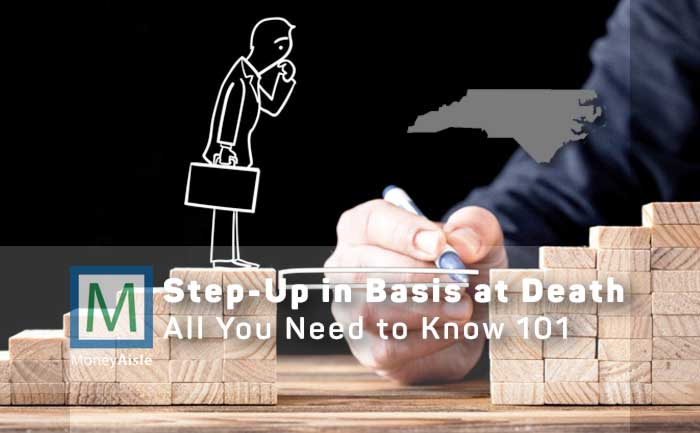What is step-up in basis and how does it work? The “Step-up” in basis at the death of the property owner adjusts the initial cost of a property to the current market prices. It helps in avoiding capital gains taxes and affects beneficiaries at the time of liquidation of inherited property/assets.
Step-Up in Basis at Death of LLC Member
Step-up in basis is a provision in the US tax law that provides favorable treatment when an LLC member dies. This provision allows the assets of the deceased LLC member to be transferred to his/her heirs with a higher value than what was originally on their balance sheet.
The “step-up” refers to an increase in the value of investments and other assets that are transferred to the heirs of a deceased LLC member. Basis refers to the value of a taxpayer’s assets for tax purposes.
So, the “step-up basis” at the death of an LLC member is essentially a tax-free windfall for the heirs that involves the adjustment of inherited property to its fair market value on the date of the LLC member’s death.
Important: An LLC is a legal business model that combines the characteristics of a sole proprietorship, a corporation, and a general partnership.
How is Step-Up in Basis at Death of LLC Member Calculated?
When you calculate step-up in basis, you’re essentially determining the new value of an asset after it’s been inherited. This new value becomes the starting point for tax purposes when the inherited asset is eventually sold.
So, you will only owe taxes on any additional appreciation that occurs after you inherit certain property. For instance, if you inherit a property that was purchased for $100,000 and it’s now worth $300,000, your cost basis will be reset to $300,000.
How Step-Up in Basis at Death Works | Example
Let’s assume an LLC owner/member owns a piece of property worth $100,000 and he/she paid $40,000 for the property. The tax basis in this case will be $40,000. If the LLC owner sells the property during his/her lifetime, they have to pay taxes on the gain in the difference between the value at the time of purchase ($40,000) and the selling price ($100,000).
According to the current tax law, the gain is treated as a capital gain if a person holds an asset for more than one year. Hence, in the above-mentioned case, the LLC member has a taxable income of $60,000 and will pay a gain tax on this $60,000 if it is sold after 1 year of acquisition of the property.
Note: The provisions of step-up in basis apply to financial assets such as bonds, stocks, real estate, mutual funds, and other tangible properties.
However, if the LLC member passes away leaving this property to his/her inheritors, they would get a step-up in basis, as of the date of the decedent’s death, to current market value.
Hence, if the inheritor sells the property for $500,000, they will have zero gain on the sale. In other words, their basis was “stepped up” to the current value of the asset as of the date of death of the original owner.
Situation Where Step-Up Basis Does Not Apply
The cost basis would step down if the price of an asset has declined from the value that was paid by the owner. Moreover, if a taxpayer gifts his/her property before his/her death, the step-up in basis does not kick in.
In the gifted property, the basis for the person receiving the gift and the basis for the person giving the gift remains the same. Such a basis is called a “carryover” basis not a step-up basis.
Advantages of Step-Up in Basis at Death of LLC Member
The step-up in basis provides several important benefits, including:
No Gain Tax
All investors including LLC owners/members are subjected to gain tax. However, after the death of the property owner, a step-up basis allows the heirs to transfer the property and other assets in their name without worrying about gain tax.
As gain tax is applied only in the lifetime of the owner and heirs get more value from these assets after the death of the investor, many investors prefer passing on their assets to their heirs as an inheritance rather than gifting any property within their lifetime.
Hence, through the step-up in basis, LLC members are able to pass on their investments to the next generation while minimizing their tax burden.
Easy Liquidation of Asset
Step-up in basis also makes it easier for heirs to manage and liquidate LLC assets following the death of an investor. For example, if an LLC member leaves a rental property that needs extensive repairs, their heirs will be able to deduct these losses from their taxes when they sell the property.
FAQs on Step-Up in Basis at Death of LLC Member
Can step-up in basis help avoid estate tax?
Step-up in basis occurs when the property is transferred to a new owner at its current fair market value, rather than its original purchase price. As a result, the new owner will not be subjected to gain tax.
However, the person who inherits the property must pay estate tax on any further appreciation in the property’s value. So, a step-up in basis can’t completely eliminate estate tax liability, it can be a helpful tool in minimizing taxes owed.
Is step-up in basis a tax loophole?
To many, “step-up in basis” is a tax loophole that allows wealthy Americans to avoid paying billions in taxes on inherited assets. The exemption of gain tax benefits wealthier families through step-up in basis is considered responsible for a significant loss of public revenue.
What is a Double Step-Up in Basis?
With community property, you may see a double step-up basis. In this process, the basis of an asset is increased by two separate amounts. This means that the first step-up in basis occurs when one spouse acquires assets held in a revocable living trust with the other spouse.
The second step-up in basis occurs when the second spouse dies. For the new beneficiary, the step-up in basis will be calculated based on the date of death of the last living spouse.
What is a “step-up in basis” concerning an LLC member’s death?
A “step-up in basis” refers to the adjustment of the value of an inherited asset, such as an interest in an LLC, to its fair market value at the date of the original owner’s death. For the heir or beneficiary, this can result in potential tax savings when they later dispose of the asset.
How does the step-up in basis affect the heirs of an LLC member?
When an LLC member passes away and their interest in the LLC is inherited, the heir receives a step-up in the basis of the interest to its fair market value at the time of death. This means if the heir later sells the interest, they will only be taxed on the appreciation from the stepped-up basis, rather than the original member’s initial basis.
Is the step-up in basis automatic upon the death of an LLC member?
Generally, yes. The step-up in basis for inherited property, including interests in an LLC, is typically automatic under U.S. tax law. However, it’s essential to keep appropriate documentation and possibly obtain a valuation of the LLC interest as of the date of death.
Does the type of LLC (single-member vs. multi-member) affect the step-up in basis rules?
The step-up in basis rules apply to inherited property regardless of whether the LLC is a single-member or multi-member entity. However, the specifics of how the LLC is taxed (e.g., as a partnership vs. a disregarded entity) might impact other tax considerations.
How does the step-up in basis interact with the LLC’s operating agreement?
While the step-up in basis is a provision of tax law, an LLC’s operating agreement might contain provisions about the transfer of membership interests upon death, which could impact the practicalities of how the stepped-up basis is utilized. It’s crucial to review both tax laws and the LLC’s operating agreement in such situations.

Aisha Noreen is an owner of a small business with more than 9 years of experience in the marketing industry. With the wisdom of an old soul, she always seeks innovation and mind-blowing ROI techniques. Her unique approach helped many small businesses thrive and she can surprise you in many ways as well. Believe it or not, her energy, passion, and creativity are contagious enough to transform your business and take it to another level.






